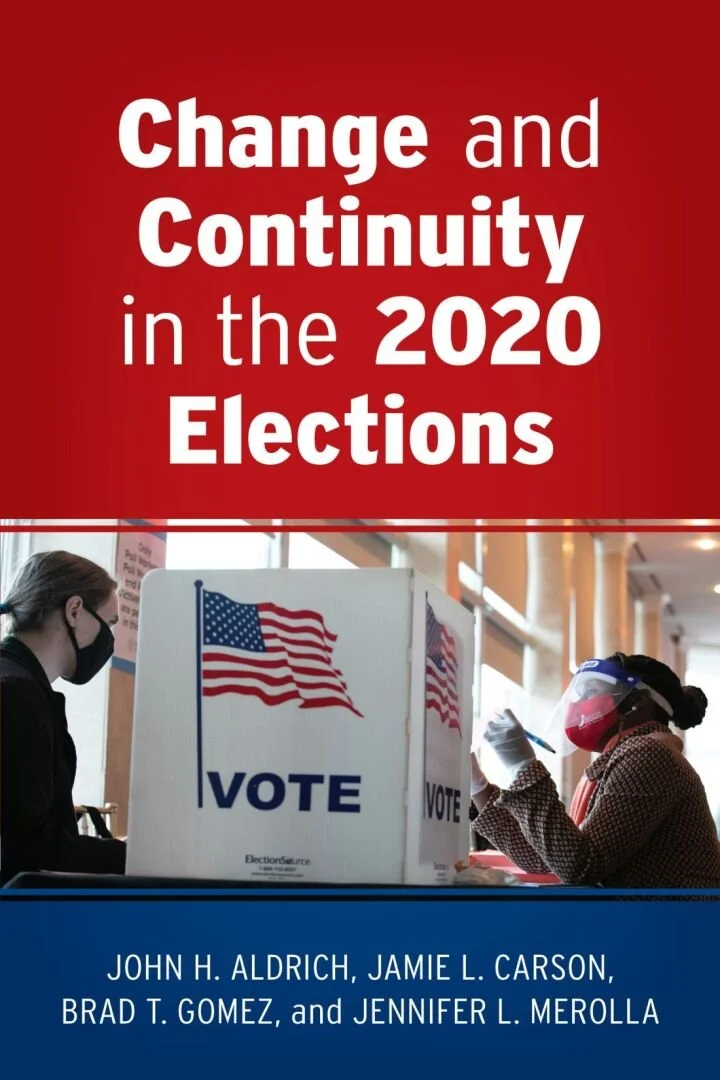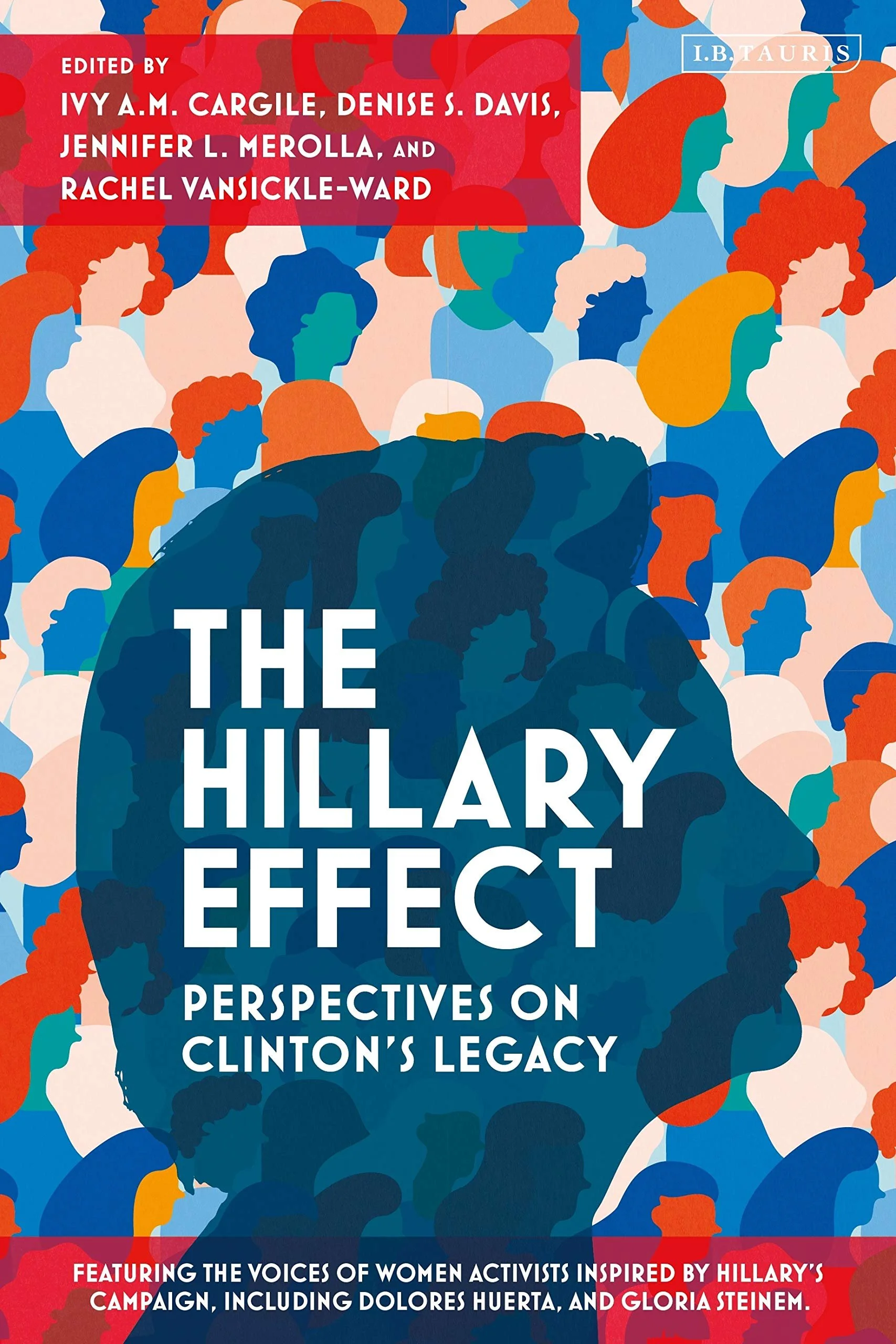BOOKS
Aldrich, John H., Jamie L. Carson, Brad T. Gomez, and Jennifer L. Merolla. Change and Continuity in the 2020 and 2022 Elections. 2023. Rowman & Littlefield.
Aldrich, John H., Jamie L. Carson, Brad T. Gomez, and Jennifer L. Merolla. Change and Continuity in the 2020 Elections. 2022. Rowman & LIttlefield.
Cargile, Ivy AM, Denise S. Davis, Jennifer L. Merolla, and Rachel VanSickle-Ward, eds. The Hillary Effect: Perspectives on Clinton’s Legacy. Bloomsbury Publishing, 2020.
Merolla, Jennifer L., and Elizabeth J. Zechmeister. Democracy at Risk: How Terrorist Threats Affect the Public. 2009. Chicago: University of Chicago Press, Chicago Studies in American Politics Series.
Change and Continuity in the 2020 and 2022 Elections
Is America in the midst of an electoral transformation? What were the sources of Joseph Biden’s victory in 2020, and how do they differ from Republican and Democratic coalitions of the past? Does the Democratic victory signal a long-term decline for Republicans’ chances in presidential elections?
Change and Continuity in the 2020 and 2022 Elections explores those questions by analyzing and explaining the voting behavior in the most recent presidential and midterm elections, as well as setting the results in the context of larger trends and patterns in elections studies. The authors present the latest National Election Studies data to help students see how social forces, party loyalties, and prominent issues affect voting behavior, turnout, and ultimately the results of presidential and congressional elections. Readers will come away with a better understanding of what the most recent elections mean for the future of American politics.
Purchase here: Rowman & LIttlefield
change and continuity in the 2020 elections
This book analyzes and explains the voting behavior in the most recent election, setting the results in the context of larger trends and patterns in elections studies and discussing its importance and impact. Readers will gain a better understanding of the 2020 election and its implications for the future of American politics.
Purchase here: Barnes & Noble and Amazon
The Hillary Effect: Perspectives on Clinton’s Legacy
This volume of over thirty essays is organised around five primary dimensions of Hillary Clinton's influence: policy, activism, campaigns, women's ambition and impact on parents and their children. Combining personal narrative with scholarly expertise in political science, this volume looks at American politics through the career of Hillary Clinton in order to illuminate overarching trends related to elections, gender and public policy. Featuring an extraordinarily varied list of contributors working within the field of political science, and a fresh interdisciplinary approach, this book will appeal to broad range of politically engaged audiences, practitioners and scholars.
Purchase here: Bloomsbury Press and Amazon
Democracy At Risk: How Terrorist Threats Affect the Public
How do threats of terrorism affect the opinions of citizens? Speculation abounds, but until now no one had marshaled hard evidence to explain the complexities of this relationship. Drawing on data from surveys and original experiments they conducted in the United States and Mexico, Jennifer Merolla and Elizabeth Zechmeister demonstrate how our strategies for coping with terrorist threats significantly influence our attitudes toward fellow citizens, political leaders, and foreign nations.
The authors reveal, for example, that some people try to restore a sense of order and control through increased wariness of others—especially of those who exist outside the societal mainstream. Additionally, voters under threat tend to prize “strong leadership” more highly than partisan affiliation, making some politicians seem more charismatic than they otherwise would. The authors show that a wary public will sometimes continue to empower such leaders after they have been elected, giving them greater authority even at the expense of institutional checks and balances. Having demonstrated that a climate of terrorist threat also increases support for restrictive laws at home and engagement against terrorists abroad, Merolla and Zechmeister conclude that our responses to such threats can put democracy at risk.
Purchase here: University of Chicago Press and Amazon
Haynes, Chris, Jennifer L. Merolla, and S. Karthick Ramakrishnan. Framing Immigrants: News Coverage, Public Opinion and Policy. 2016. New York: Russell Sage Foundation.
Framing Immigrants: News Coverage, Public Opinion, and Policy
While undocumented immigration is controversial, the general public is largely unfamiliar with the particulars of immigration policy. Given that public opinion on the topic is malleable, to what extent do mass media shape the public debate on immigration? In Framing Immigrants, political scientists Chris Haynes, Jennifer Merolla, and Karthick Ramakrishnan explore how conservative, liberal, and mainstream news outlets frame and discuss undocumented immigrants. Drawing from original voter surveys, they show that how the media frames immigration has significant consequences for public opinion and has implications for the passage of new immigration policies.
The authors analyze media coverage of several key immigration policy issues—including mass deportations, comprehensive immigration reform, and measures focused on immigrant children, such as the DREAM Act—to chart how news sources across the ideological spectrum produce specific “frames” for the immigration debate. In the past few years, liberal and mainstream outlets have tended to frame immigrants lacking legal status as “undocumented” (rather than “illegal”) and to approach the topic of legalization through human-interest stories, often mentioning children. Conservative outlets, on the other hand, tend to discuss legalization using impersonal statistics and invoking the rule of law. Yet, regardless of the media’s ideological positions, the authors’ surveys show that “negative” frames more strongly influence public support for different immigration policies than do positive frames. For instance, survey participants who were exposed to language portraying immigrants as law-breakers seeking “amnesty” tended to oppose legalization measures. At the same time, support for legalization was higher when participants were exposed to language referring to immigrants living in the United States for a decade or more.
Framing Immigrants shows that despite heated debates on immigration across the political aisle, the general public has yet to form a consistent position on undocumented immigrants. By analyzing how the media influences public opinion, this book provides a valuable resource for immigration advocates, policymakers, and researchers.
Purchase here: Russell Sage Foundation and Amazon





